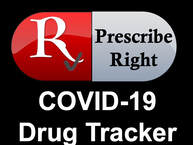|
Remdesivir
The FDA approved an emergency use authorization (EUA) for remdesivir to treat hospitalized patients with severe COVID-19. The U.S. Government will control distribution through authorized wholesalers or government agencies. The government will tell the wholesalers where they can ship drug supplies. The initial emphasis will be on areas with the highest number of cases. Gilead has not announced pricing for remdesivir. The initial supply from the Federal Stockpile is from 1.5 million doses donated by Gilead to the U.S. and other countries. ICER released a preliminary pricing review for remdesivir on 5/1/2020. ICER developed two pricing estimates. One is a cost recovery pricing estimate, based on a review of the cost of producing the final finished product. ICER estimated a cost recovery price of $1 per dose or $10 for a 10-day course and $5 for a 5-day course. Using a threshold price at $50,000 per incremental quality-adjusted life year (and equal value of a life-year gained) and the benefits seen in the Adaptive COVID-19 Treatment Trial (ACTT), ICER estimated a cost-effective price of $4,460 for a 10-day course of remdesivir assuming a mortality benefit and $390 with no mortality benefit. The EMA is reviewing clinical data for remdesivir with the possibility of accelerated approval. Remestemcel-L Mesoblast is evaluating remestemcel-L as a treatment for moderate-to-severe acute respiratory distress syndrome (ARDS) due to COVID-19 in a 300 patient, Phase I/II trial (NCT04366323). COVID-19 Vaccine The U.S. is establishing Operation Warp Speed to speed the development of a vaccine for COVID-19. Operation Warp Speed will coordinate the effort of pharmaceutical companies, government agencies and the military. Federal money will fund the program with a goal of having 300 million doses of vaccine available by January. The program will use government resources to quickly perform tests in animals, so human clinical trials can be launched as soon as possible. In order to achieve the goal of vaccine availability, vaccines may be manufactured before it is known if they will work. Many doses may be wasted before an effective vaccine is identified. Creating a vaccine in 12-18 months would be unprecedented. It took five years for approval of an Ebola vaccine. Oxford University is evaluating a COVID-19 vaccine that uses a genetically modified non-replicating adenovirus that has been genetically modified to contain spike proteins from COVID-19, which should cause the body to produce antigens as the virus infects cells to prune the spike protein. AstraZeneca signed an agreement with Oxford University to take over development, manufacturing and distribution of the vaccine. AZ’s COVID-19 vaccine is currently in a Phase I trial being conducted by Oxford University with results expected in early summer. If successful, a 5,000 patient trial is planned to begin in the fall. Moderna has entered an agreement with Swiss pharmaceutical company Lonzo to help manufacture Moderna’s mRNA-1273 COVID-19 vaccine. Lonzo will begin manufacturing the vaccine this summer at a U.S. facility and will expand manufacturing to other locations in order to scale up to 1 billion doses per year. If Moderna’s Phase I study is successful the company will initiate a 600 patient, Phase II trial, where patients will be given two doses, 28-days apart, of mRNA-1273 low dose (50 micrograms), high dose (250 micrograms) or placebo. Half of the patients enrolled in the trial will be older than 55. Comments are closed.
|
Stay informed, subscribe to the Prescribe Right Pharmaceutical Pipeline Tracker
Archives
January 2023
Categories |
Services |
Company |
Support |
© COPYRIGHT 2015. ALL RIGHTS RESERVED.
|


 RSS Feed
RSS Feed